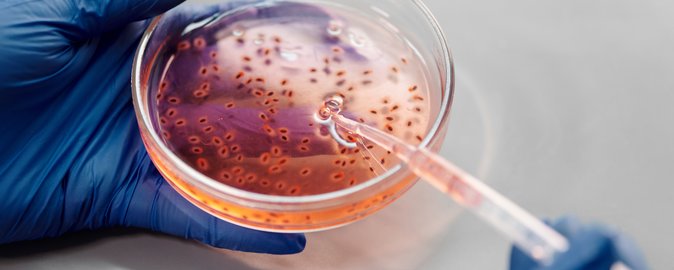- Education
-
Research
Current research
Talent
-
Collaboration
Businesses
Government agencies and institutions
Alumni
-
About AU
Organisation
Job at AU
As one of the few places in Denmark, Aarhus University has already established the use of genome-wide CRISPR libraries. The technology is now in use at the Department of Biomedicine, and from here Professor with special responsibilities (MSO) Jacob Giehm Mikkelsen reaches out to researchers from other fields.
2021.05.05 |

If you don't know where to begin and end in the giant haystack of genes, you can use a genome-wide CRISPR library to directly identify the genes you're searching for. Stockphoto: Pexels
It can feel like the last piece of the puzzle – or perhaps the proverbial needle in the haystack – to search for a specific gene in a signal path, or the genes that make cells resistant to a specific medicinal product. Without the right tools, you can risk a very long search.
Since 2019, the Department of Biomedicine has been home to a technology that can screen amongst all the genes in the human genome, or in animals, and select after function. The use of a genome-wide CRISPR library makes it possible to knockout all genes in the genome one by one, which has great perspectives and broad applications.
"If you're looking at cell lines and don't know where to begin and end in the giant haystack of genes, you can use a genome-wide CRISPR library to directly identify the genes you're searching for. It’s a unique tool for identifying precisely the genes that are relevant to the disease or cellular phenotypes that you’re investigating," says Professor MSO Jacob Giehm Mikkelsen.
He is certain that the screening tool is of interest for many researchers at Aarhus University.
"You can spend a lot of time looking for genes that do something specific in relation to whatever it is you’re studying. Perhaps you’re studying how cells react to external stimuli such as a virus. Or you’re interested in which genes regulate others. Or maybe you want to identify genes that have significance for a particular biological mechanism such as cancer cells resistance to treatment. We can screen the entire human genome, which consists of approximately 25,000 genes, and identify the genes involved in the process," explains Jacob Giehm Mikkelsen.
A genome-wide CRISPR library is relatively resource-demanding to develop, but now that it is available in Aarhus, Jacob Giehm Mikkelsen sees it as a tool that can strengthen the development of the university in many directions. The researchers from the Department of Biomedicine already have specific collaborations across Aarhus University and Aarhus University Hospital, and they would be happy to see others benefit from their experience.
Knowledge of bioinformatics is necessary if someone wishes to make use of the library, but Jacob Giehm Mikkelsen and his colleagues are ready with both help and expertise.
"We use virus to deliver a library of CRISPR to the cells, thereby knocking the genes out of function, one single gene per cell – and this requires knowledge of the cell lines you are working with as well as their susceptibility to the library which is delivered with the virus. You also need to be able to subsequently identify the genes that have been affected or have influenced the process. People are welcome to contact us so we can find out whether we can help or maybe write a funding application together," says Jacob Giehm Mikkelsen.
Interested in finding out more? Then please contact Professor with special responsibilities (MSO) Jacob Giehm Mikkelsen at giehm@biomed.au.dk
Professor MSO Jacob Giehm Mikkelsen
Institut for Biomedicin
giehm@biomed.au.dk
+45 23 61 72 53